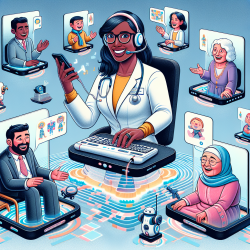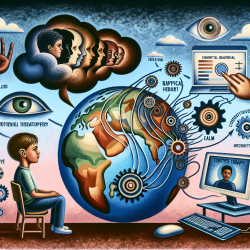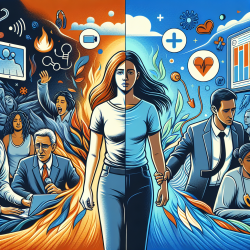The field of telepsychiatry is rapidly expanding as a crucial component of mental healthcare delivery, offering solutions to regional disparities in access to care. A recent study titled "Defining competencies for the practice of telepsychiatry through an assessment of resident learning needs" provides valuable insights into the specific skills required for effective telepsychiatry practice and offers guidance on developing robust educational curricula.
The Importance of Competency Development
The study highlights the necessity of explicit competency development in telepsychiatry to ensure practitioners are well-equipped to deliver quality care. The research identifies several domains of competency that are essential for telepsychiatry, including:
- Technical Skills: Proficiency in operating videoconferencing equipment and software is crucial for seamless patient interactions.
- Assessment Skills: Adapting assessment processes to be carried out remotely, including conducting comprehensive mental status exams via televideo.
- Relational and Communication Skills: Building therapeutic alliances through technology and effectively communicating with patients and their families.
- Collaborative and Interprofessional Skills: Working with interprofessional teams across distances to ensure continuity of care.
- Administrative Skills: Understanding the organization and administration of telehealth networks.
- Medico-Legal Skills: Adhering to legal standards while providing remote care.
- Cultural Psychiatry Skills: Demonstrating sensitivity to local cultures and social determinants of health.
- Knowledge of Health Systems: Using technology to address systemic inequities in access to care.
The Role of Education in Skill Development
The research emphasizes the importance of incorporating telepsychiatry training into postgraduate medical education. By providing residents with adequate exposure to telepsychiatry during their training, we can foster interest and equip them with the confidence and skills necessary for future practice. The study suggests that experiential learning, combined with didactic methods, is critical for acquiring these competencies.
The integration of telepsychiatry into medical curricula should include hands-on experiences supervised by experts in the field. This approach not only enhances learning but also helps demystify the process for those who may view telepsychiatry as an unfamiliar modality requiring specific technical skills.
A Call to Action for Practitioners
This research serves as a call to action for practitioners to engage in continuous professional development by embracing telepsychiatry as a viable mode of practice. By honing the competencies identified in this study, practitioners can improve their service delivery and contribute to reducing health disparities through innovative care models.
If you are a practitioner looking to enhance your skills in telepsychiatry or interested in developing educational programs, consider exploring further research and training opportunities. Embracing these competencies will not only improve individual practice but also positively impact our health systems and promote health equity.










